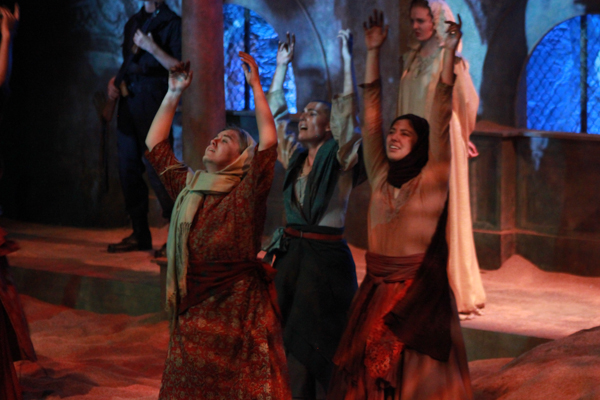
“The Trojan Women” was as phenomenal as it was heartwrenching.
“The Trojan Women,” written by Euripides (adapted by Ellen McLaughlin) and directed by Nancy Saklad, was SUNY New Paltz’s first Mainstage performance of the semester.
According to the Mainstage productions page on newpaltz.edu, “‘The Trojan Women’ is a classical ancient Greek tragedy that relays the horrors of war as told by the women who survive the ploy of the Trojan horse and the battle of Troy.”
The basis of the set was simple but effective, which made the lighting and the graphics truly shine as a masterpiece of their own.
What really intrigued me about the set was how the entire floor of the stage was covered in sand. It heightened the feel of the setting as you watched the sand fall off of clothing, out of hair and how the sand would be kicked up during a dramatic exit. It gave the play a more lifelike feel.
The musical aspect made the play more movie-like, dramatizing the lines. I also enjoyed the visual aspect of the costumes and how unique they were to each character.
I was able to get a front row seat on the left side of Parker Theater, which is a thrust style theater. My seating made the play that much more intense because I was right in the action of what was happening; at some moments of the play, the actors stood mere inches away from me.
The cast as a whole worked together very well and each individual was able to shine no matter how short or how long their stage time was.
The women in this play brought a unique aspect to the performance. They were all truly dedicated to their craft and their purpose of contributing to the whole of the play. According to the director’s notes,“while the named Trojan and Greek characters take us back to the fifth century B.C., each woman of the chorus evokes the victims of a particular genocide in the past one hundred years.”
One scene I enjoyed was a scene toward the end of the play with Andromache, played by Alicia Dee Leduc, and Talthybius, played by Eric Hibschweiler. The last hope for all of these women was the son of Andromache. It made me feel lighter knowing that these women had something to help them have some hope for the future. But in the end, the baby is taken away by Talthybius and killed. Watching Andromache’s heartwrenching performance of a mother losing her child resonated with me long after the play was over.
I’m always astounded by the work of the SUNY New Paltz theater community.
The next Mainstage production is “Much Ado About Nothing,” written by William Shakespeare and directed by Frank Trezza, running on April 16-19 and April 23-26 in McKenna Theater.
